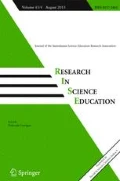Summary
The thrust of this article is that although different theories may share some of the same terminology they may differ considerably in the interpretation which they impose on it and, therefore, on the educational practices which they underwrite. Specifically a brief examination has been made here of the concept of cognitive conflict as it occurs in the theories of Bruner, Case and Piaget-Inhelder, and of the similarities and differences in classroom practices which arise from theoretical commitment.
Similar content being viewed by others
References
BOWER, T.G.R.Development in infancy. San Francisco: W.H. Freeman, 1974.
BRUNER, J.S. & KENNY, H.J. Representation and mathematics learning.Monographs of the Society for Research in Child Development, 1965, 30, 50–59.
BRUNER, J.S., OLVER, R.R. & GREENFIELD, P.M.Studies in Cognitive Growth. New York: John Wiley & Sons. 1966.
CASE, R. Gearing the demands of instruction to the developmental capacities of the learner.Review of Educational Research, 1975, 45, 59–87.
CASE, R. A developmentally based theory and technology of instructin.Review of Educational Research, 1978, 48, 439–463.
FODOR, J.A.The language of thought. Sussex: Harvester Press, 1976.
FURTH, H.G.Piaget and knowledge:Theoretical foundations. New Jersey: Prentice-Hall, 1969.
GAGNÉ, R.M.The conditions of learning. New York: Holt, Rinehart & Winston, 1970.
INHELDER, B. & PIAGET, J.The growth of logical thinking from childhood to adolescence. London: Routledge & Kegan Paul, 1958.
INHELDER, B., SINCLAIR, H. & BOVET, M.Learning and the development of cognition. Cambridge, Mass. Harvard University Press, 1974.
KARMILOFF-SMITH, A. & INHELDER, B. If you want to get ahead get a theory.Cognition, 1974, 3, 195–212.
KLAHR, D. & WALLACE, J.G.Cognitive development: An information-processing view. New Jersey: Lawrence Erlbaum, 1976.
LERNER, R.M. Nature, nurture and dynamic interactionism.Human Development, 1978, 21, 1–20.
McNEIL, D. Cognitions and conservations: two views.Contemporary Psychology, 1967, 12, 530–532.
MOESSINGER, P. Piaget on contradiction.Human Development, 1977, 20, 178–184.
OLSON, D.R. On a theory of instruction: why different forms of instruction result in similar knowledge.Interchange, 1972, 3, 9–24.
OLSON, D.R. & BRUNER, J.S. Learning through experience and learning through media. In Olson, D. (ed.)National Society for the Study of Education 73rd Yearbook, Part 1. Chicago: University of Chicago Press, 1974.
PIAGET, J. & INHELDER, B.The psychology of the child. London: Routledge & Kegan Paul, 1969.
ROWELL, J.A. & DAWSON, C.J. Teaching about floating and sinking: further studies toward closing the gap between cognitive psychology and classroom practice.Science Education, 1977, 61, 527–540.
ROWELL, J.A. & DAWSON, C.J. Skill integration, Piaget and education.Studies in Science Education, 1979, 6, 45–68.
ROWELL, J.A. & RENNER, V.J. Quantity conceptions in university students: another look.British Journal of Psychology, 1976, 67, 1–10.
STRAUSS, S. Inducing cognitive development and learning: a review of short-term training experiments. 1. The organismic developmental approach.Cognition, 1972, 1, 329–357.
Rights and permissions
About this article
Cite this article
Rowell, J.A., Dawson, C.J. Cognitive conflict: Its nature and use in the teaching of science. Research in Science Education 9, 169–175 (1979). https://doi.org/10.1007/BF02359157
Issue Date:
DOI: https://doi.org/10.1007/BF02359157




